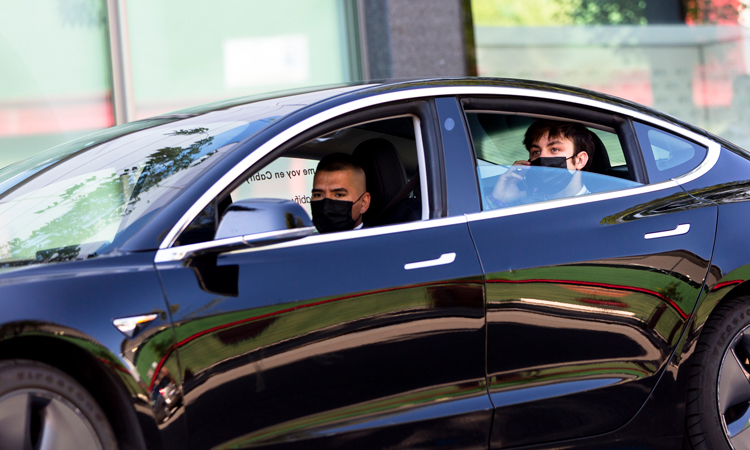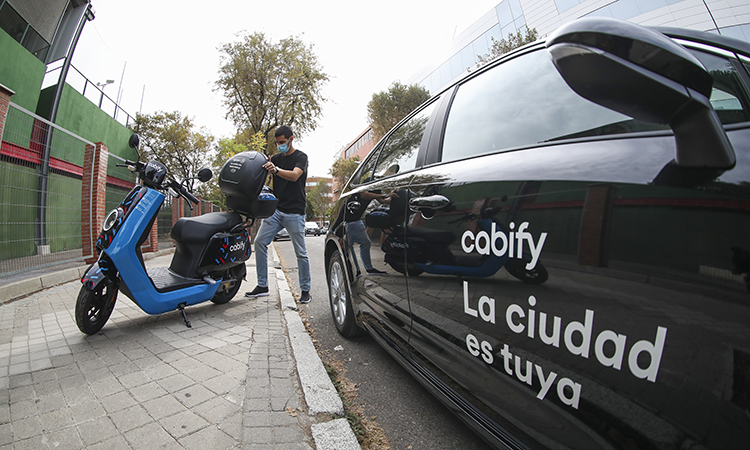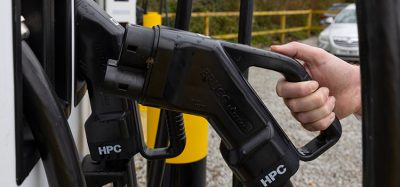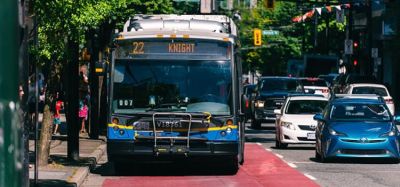Shared mobility: Shaping the future of cities
- Like
- Digg
- Del
- Tumblr
- VKontakte
- Buffer
- Love This
- Odnoklassniki
- Meneame
- Blogger
- Amazon
- Yahoo Mail
- Gmail
- AOL
- Newsvine
- HackerNews
- Evernote
- MySpace
- Mail.ru
- Viadeo
- Line
- Comments
- Yummly
- SMS
- Viber
- Telegram
- Subscribe
- Skype
- Facebook Messenger
- Kakao
- LiveJournal
- Yammer
- Edgar
- Fintel
- Mix
- Instapaper
- Copy Link
Posted: 10 March 2022 | Lucía Chávarri - Cabify | No comments yet
Lucía Chávarri, Vice President of New Business at Cabify, addresses the need to re-think current mobility models as cities battle congestion, carbon emissions and inefficient travel, and explains how shared mobility can act as an enabler for such change.


Credit: Cabify
This November, the COP26 Climate Summit and the recent European Mobility Week have brought back to the table something that the COVID-19 pandemic itself has highlighted and even accelerated – namely, the urgent need to address fundamental transformations in current urban mobility patterns. The way that we move around today is clearly unsustainable: we face intense congestion and environmental imbalance, but also the serious impact that pollution or stress has on the wellbeing of those of us who live in cities in any region of the world. Urban centres generate 70 per cent of global greenhouse gas (GHG) emissions, and road transport accounts for 12 per cent of them, according to the International Energy Agency and C40 Cities.
There is no better time to promote this transition than now, as we have the knowledge, technology and alternatives that can enable the change for the better that cities need”
This is why it is necessary to rethink the current mobility model and seek formulas that allow us to move around in the most flexible, efficient and cleanest way possible, rationalising the use of the private car. And there is no better time to promote this transition than now, as we have the knowledge, technology and alternatives – such as shared mobility – that can enable the change for the better that cities need.
The shift towards sustainability
The current horizon is also encouraging from the point of view of growing social and political awareness of sustainability. Traditionally, transformations in urban morphology and transport were linked to economic, productive, ethical and political logic and values. One example was when the megacities of the mid-20th century began to connect distant urban centres through complex urban mobility systems. Today, however, and for the first time, urban morphology and mobility are undergoing profound transformation processes in favour of sustainability criteria. Once again, an accelerated change is emerging, and it does so as a consequence of the need to take measures to move urban centres and urban transport from being the focus of today’s main threat to human beings, to being major drivers of opportunities and sustainable and healthy lifestyles.
The cities of the future are beginning to make their way into the present: greener, more responsive and smarter cities, where living environments and the need to reduce the impact of traffic and the scarcity of urban space on our quality of life are increasingly valued. And, within this model, the adoption of a wider set of shared mobility alternatives, as well as decarbonisation, must move forward faster to solve the most pressing urban challenges.


Credit: Cabify – Cabify is advocating for and building a multimodal, accessible and sustainable ecosystem based on technological innovation.
As the Italian urban planner Bernardo Secchi points out, there is currently the paradox that, despite population stagnation, most European cities continue to grow geographically (and their potential impact is also growing), which makes sustainable mobility systems necessary to connect shopping and leisure centres, university campuses, hospitals, financial districts and residential areas (sprawls), that are increasingly dispersed in the growing peripheries.
Here in Spain, we have many interesting cases. If we look at the residential dispersion and new socio-spatial configuration of areas such as the Metropolitan Region of Barcelona, we can see how the transformation of the peripheries that began in the late 1980s has led to unprecedented population growth, with repercussions on mobility needs, the housing market and the balance with the environment.
Battling high dependency on private transport
This trend in contemporary urban planning presents, above all, an environmental problem associated with the extensive consumption of urban space (in some cities, 70 per cent is occupied by cars), excessive urbanisation of the territory and a high dependence on private transport. It is, therefore, vital to have efficient public transport networks, more and better public spaces for people and to advance the electrification of vehicles, as we at Cabify are committed to doing.
It is, therefore, vital to have efficient public transport networks, more and better public spaces for people and to advance the electrification of vehicles”
Walking and public transportation are always going to be the most sustainable ways to move because of their zero emissions and capacity, respectively, but may not be the most efficient in other terms (time, location, availability, inclusion, etc). That’s why we are advocating and building a multimodal, accessible and sustainable ecosystem based on technological innovation to offer users the best possible option at any time.
Actually, more and more people believe that modalities such as car-sharing, ride-hailing or leasing will eventually replace car ownership in the short- to medium-term. Moreover, the fact that 50 per cent of people consider their smartphones to be more important than car ownership is indicative of the role of technology in the consumption patterns that are gaining momentum among us.
Technological solutions are fuelling shared mobility
Also, in the context of the pandemic, technology‑based solutions fuelling shared mobility have proved able to add value with new alternatives. We entered the delivery segment with the launch of our courier service Cabify Envíos in April 2020, making our transport infrastructure available to cities and communities at a time of unprecedented logistical and mobility challenges. Almost a year and a half after the start of these operations, the balance is resoundingly positive and enjoys great success in Argentina, Chile, Colombia, Ecuador, Mexico, Peru, Uruguay and Spain. In addition, more recently, we announced that we are working on a number of pilot projects with major Latin American retailers for the activation of an innovative B2B2C retail delivery service. With this decision, we aim to promote efficient, multimodal mobility of objects, delivered on net-zero rides for the first time.
Multi-mobility and innovation are, in our view, the two central ingredients to minimise sustainable impact and respond to the new mobility demands that today’s users of passenger and goods transport services are increasingly expressing. They are looking for flexibility, the power to make informed choices through technology and truly efficient transport options. Our recent survey of thousands of citizens in Spain and Latin America for the report ‘Reimagining Cities’ shows that 43.1 per cent of Spaniards highlight “taking as little time as possible” or “getting to the destination on time” as the most important factors when it comes to getting around.
A city only flourishes and evolves when all of its inhabitants can fully participate in its opportunities, when access to mobility is inclusive and real”
At Cabify, we have made important commitments and achieved various milestones in terms of environmental, social and economic sustainability. Specifically, in terms of environmental balance, we are committed to a 15 per cent annual emissions reduction and have been the first, and only, carbon-neutral mobility app in Latin America and Europe for three years now. In 2020, we announced the pioneering implementation of blockchain technology for the efficiency and traceability of funds that we allocate to offsetting projects in countries such as Chile and Peru. We also remain determined to advance the electrification of our vehicle fleet, whose average age (two years) is well below the average age of vehicle fleets in all the countries where we operate.
A city only flourishes and evolves when all of its inhabitants can fully participate in its opportunities, when access to mobility is inclusive and real. Based on this conviction, since 2019, we have made our app 100 per cent accessible to blind people, and we are moving towards total accessibility, making transport easily accessible to deaf people, the elderly, people with attention deficits, etc.
Technological innovation is key
Technological innovation is innate to the entrepreneurial projects of start-ups like ours, and in mobility the potential is immense. We have been able to implement improvements in our technological systems to reduce empty kilometres (when the driver travels without a passenger) and also to optimise journeys to the maximum, reducing arrival and waiting times. In addition, with services such as Super (delivery of food products in collaboration with Lola Market) or Bive (bicycle rental by subscription), we avoid the unnecessary use of private vehicles and promote more sustainable mobility.
Technological innovation is innate to the entrepreneurial projects of start-ups like ours, and in mobility the potential is immense”
Electric micro-mobility (motorbikes and scooters) – another of our major commitments – has also proven its impact, avoiding the emission of 90 tonnes of CO2 in 2020. In countries like Spain, where there are over 24 million registered cars – according to the Directorate-General of Traffic – this sort of shared mobility alternatives can be instrumental in achieving a more efficient use of public space and remarkably better air quality.
Shared mobility plays a key role in finding solutions to the challenges ahead. We must therefore guarantee the future of cities by protecting environmental balance and social cohesion through a transport model that is truly compatible with that future. This is how we can make our cities better places to live in, where people and the planet are the most important things.
Lucía Chávarri has been the Vice President of New Business at Spanish multi-mobility startup Cabify since 2019. A Telecommunications engineer from the Polytechnic University of Madrid, she has also served as a Board Member at electric micro-mobility company MOVO and fintech firm Lana, and priorly as a consultant for Pwc Brazil. Chávarri also led entrepreneurship initiatives like dating app Muapp and social network Wibbi.
Related topics
Air Quality, Mobility Services, Multimodality, On-Demand Transport, Sustainable Urban Transport, Traffic Management
Issue
Issue 4 2021
Related modes
Ride-sharing & Car-sharing
Related countries
Spain
Related organisations
Cabify
Related people
Lucía Chávarri








